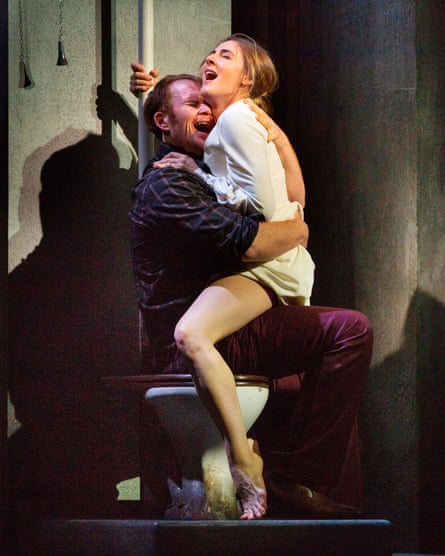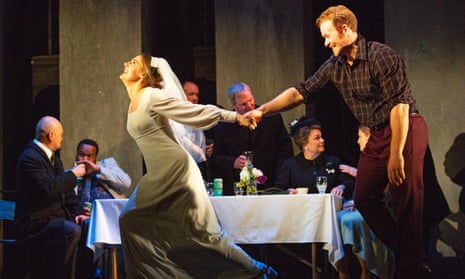Religious zealotry meets eroticism in Lars von Trier’s 1996 film Breaking the Waves. Harrowing, beautiful and strange in equal measure, the film tells the story of innocent, otherworldly Bess, a young woman living in a restrictive Presbyterian community on a remote Scottish island and her relationship with the outsider Jan, a worker on the oil rigs.
It was the complex nature of the heroine that attracted US composer Missy Mazzoli and her librettist collaborator Royce Vavrek to the idea of turning Von Trier’s work into an opera. The result was first staged in Philadelphia in 2016 and is now receiving its European premiere at the Edinburgh international festival.
Mazzoli and Vavrek adhere fairly closely to the film’s structure, and this is where the problems start: what works well as narrative on screen doesn’t translate so happily to the stage. The opera is most successful in its opening act, contrasting Bess and Jan’s passion against the narrow-mindedness of the Free Church elders. Later, as the melodrama mounts, with Bess resorting to ever more risky sexual encounters, the opera loses its way. The strange, almost lyrical drama of the film is missing, and there isn’t enough dramatic tension to sustain momentum, particularly in the closing scenes where the the mystical, fey quality of the film is transformed into something rather more mundane.

Musically, Mazzoli’s style is what could best be described as postmodern minimalism, lots of surface interest and repetitive figures beneath. The initial contrast between Bess’s free-flowing lyricism and the clipped phrases of the church elders is interesting. However, the score doesn’t do enough to build the dramatic tension. The combination of chamber ensemble, soloists from the Orchestra of Scottish Opera conducted by Stuart Stratford together with synthesiser and electric guitar felt too thin at times, too noisy at others.
The staging, a collaboration between Opera Ventures and Scottish Opera, is more successful. Director Tom Morris has created a streamlined production with Soutra Gilmour’s elegant set, a geometric sequence of pillars on a revolve combining with Richard Howell’s lighting to suggest the hard, unyielding nature of the church, the barren landscape and the setting of the rig. There is some memorable singing too, particularly from Sydney Mancasola as Bess, who captures the childlike quality of the character, despite some slightly strange use of dialect, and Wallis Giunta as her supportive, more grounded sister-in-law Dodo. As Jan, Duncan Rock has rather less to do, and on the opening night Freddie Tong’s church elder could have been a little more stentorian.

Comments (…)
Sign in or create your Guardian account to join the discussion